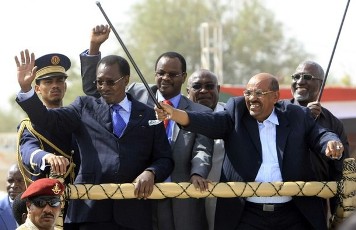Sudan’s Bashir accuses foreign groups of using Darfur for profits
February 8, 2012 (KHARTOUM) – The Sudanese President Omer al-Bashir has accused foreign groups of profiting from the crisis in Darfur, vowing to fully implement a deal aimed at ending years of insurgency and dependency on aid in his country’s western region.

The new body is designed under the DDPD to act as the principal instrument for the implementation of the framework text. Also with the other regional and national institutions, the DRA has to guarantee the effective enjoyment of all rights and freedoms in the region.
The celebration in El Fashir was attended by a host of dignitaries including Chadian President Idris Deby, the Qatari Minister of Justice Hassan Abdellah Al-Ghanim, Burkina Faso’s foreign minister and former United Nations African Union (UN-AU) mediator for Darfur Djibril Bassolé, and the special joint representatives of the UN-AU peacekeeping mission in Darfur (UNAMID) Ibrahim Gambari.
In the speeches preceding that of Bashir, President Deby and the Qatari minister urged other rebel factions which rejected the Doha accord to join the peace process.
Deby said that there are no alternatives to the DDPD and pledged that his country, which neighbours the troubled region, would contribute despite its “humble resources”, to strengthening peace in Darfur.
Similarly, Bassolé and Gamabari said that non-signatory groups need to enter into dialogue with the government without preconditions in order to end the war and achieve stability in Darfur.
The DRA’s chairman and LJM leader, al-Tijani Sissi, also delivered a speech in which he said that the will to realize peace in Darfur has never been stronger, urging other rebel groups to join the DDPD.
The Doha framework agreement left a room for the inclusion of other non-signatory groups, the most notably of them is the Justice and Equality Movement (JEM), whose leader Khalil Ibrahim was killed last month.
JEM along with two factions of the Sudan Liberation Movement (SLM) led by Abdel Wahid Mohamed Nur and Minni Arkoi Minnawi have not signed the DDPD. Unlike the SLM factions which have not been included in the Doha talks, JEM participated in the negotiations but refused to sign the agreement.
In his address, Bashir granted clemency to LJM members and instructed the authorities to begin the process of security arrangements to integrate former rebels into regular forces and gather arms from the hands of civilians.
He also said his government was seeking to foster reconciliation between rival tribal groups and patch up Darfur’s social fabric which has been destroyed by the conflict.
Turning to the issue of displacement, Bashir promised those living in camps to end their misery and dependence on humanitarian aid, calling on them to return to the villages.
The Sudanese leader went on to launch an attack on foreign aid groups, saying they have used Darfur crisis as a money-making scheme.
He singled out the Save Darfur Coalition, a US-based advocacy group comprising more than 160 organisations, as an example of those who made profits out of Darfur. He told the crowd that those in charge of coalition had raised gigantic amounts of fund to help Darfur, but they ended up putting that money in their own pockets.
The current round of conflict in Darfur has led to the death of 300,000 people and displacement of 2.7 million since its eruption in 2003, according to UN figures. Incidents of insecurity still occur despite a significant lull in fighting in recent years.
(ST)
